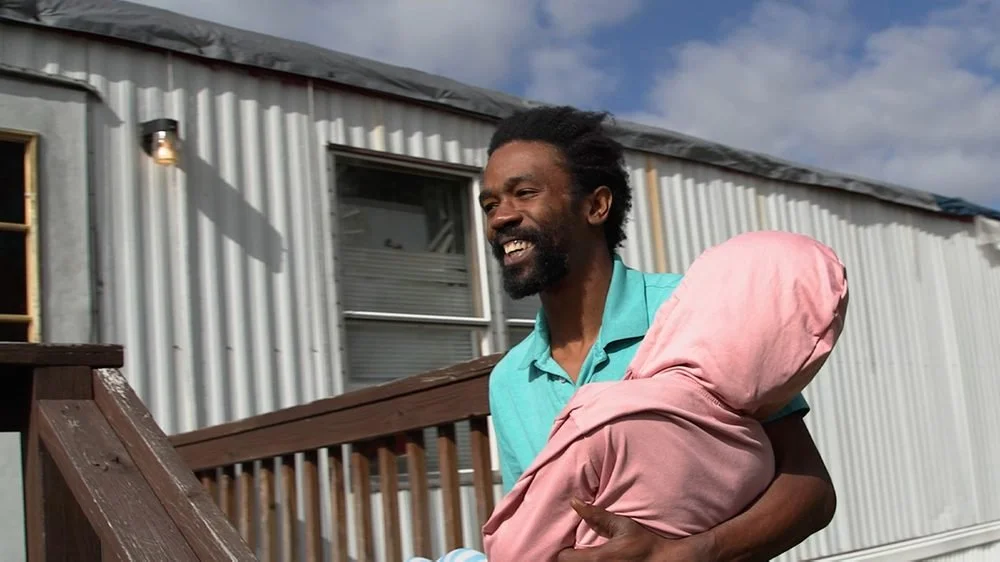At VIFF, documentaries explore humans’ relationships with high tech
*smiles and kisses you*, Grand Theft Hamlet, and Real offer moving and unsettling views of how we attempt to heal ourselves as part of the Spectrum series
*smiles and kisses you*
BACK IN THE late ’60s, author Philip Dick asked if androids dream of electric sheep. In one of the three exceptional documentaries screening in Vancouver International Film Festival’s Spectrum program, an iPhone appears to dream of a life outside itself. It brings an unnerving thrust to *smiles and kisses you*, the story of a 36-year-old man and his relationship with a Real Doll called Mimi. There’s always been a spooky edge to the vision of transhumanism and artificial intelligence pursued by the High Priests of Silicone Valley and a foreboding sense that we’re messing with forces best left alone. Bryan Carberry’s touching film brings those anxieties to the surface.
Chris Stokes is a bright and likeable gas station worker in North Carolina who lives in a trailer with his best friend and fellow nerd, Jonah. Loving mother Teresa is a Jehovah’s Witness while Chris’s dad was a military vet who disappeared after putting a gun to Teresa’s head. With a past that includes homelessness and a future no less dim, Chris has disappeared into the comforts of anime, D&D, and intense online fandom. But he’s a thoughtful and gregarious guy and he has no problem opening up about his intense relationship with a $700 simulacrum.
It’s unsettling, but there’s a lot of warmth to *smiles and kisses you* which doesn’t quite go where we might expect. Chris has appended Mimi to an online AI and routinely converses with her, asking questions like, “Is love worth the pain?” If it isn’t obvious already, there’s a very big wound in this man’s relationship history, and Mimi, it turns out, is Chris’s attempt to recreate a former love. It would be wrong to reveal what happened between Chris and the real Mimi, aka Michelle, but it significantly intensifies our disquiet when the bot and the human seem to merge.
Even then, *smiles and kisses you* is an uplifting movie that elegantly reaffirms the ineffability of organic life and the tireless human drive to heal ourselves. As a critique of the digital landscape we now inhabit, the film maintains a tasteful distance. It does, however, quietly make a point about the effects of COVID lockdowns—very good for the tech giants, not so good for quality of life—which *hugs and kisses you* shares with another doc appearing in the Spectrum series.
Grand Theft Hamlet
In Grand Theft Hamlet, which shares some DNA with Michael Sheen and David Tennant’s lockdown comedy, Staged, two homebound actors in the U.K. idle their pandemic time inside the vast world of GTA Online. When a car chase leads them to an enormous outdoor theatre hidden in the hills of the game’s fictional city of Los Santos, Sam and Mark land on the idea of mounting a production of Hamlet—an insane project inside a virtual realm of constant and random psychopathic violence.
Eventually the duo is joined by Sam’s documentarian partner Pinny Grylls (who directs) and an array of curious and lonely souls. Made entirely in game, a measure of the films’s comedy comes from the incongruity between the players’ voices and their ridiculous avatars—with the exception of Mark, who’s designed not as a gangbanger or an alien, but as a sort of anxious middle-management type, poignantly reflecting the angst he suffers, alone, in real life.
Otherwise, Grand Theft Hamlet prompts us to think about the indefatigable nature of creativity, which a sandbox the size of Grand Theft Auto still can’t contain. Sam and Mark break all the rules, make something beautiful, and humanity wins again. Which might be the larger point of the third title in the Spectrum series to address the seismic shift onto online life. Made by Adele Tulli, Real is an impressionistic collage of influencers and streamers spilling their lives onto the screen and carving out those 15 minutes we were all promised.
Around the same time that Phil Dick was wondering about the dreamlife of the android, Marshal McLuhan was cautioning that “the Global Village is a place where you don’t necessarily have harmony, you have extreme concern with everyone else’s business and much involvement in everybody else’s lives.” That’s social media in a nutshell, but Real isn’t telling anyone to touch grass, instead offering a fairly breathtaking stream of images and sound with the basic premise that people are fascinating and eminently watchable—and perhaps prone to getting lost in any novel technology. It’s like Koyaanisqatsi for the Twitch generation. ![]()


























